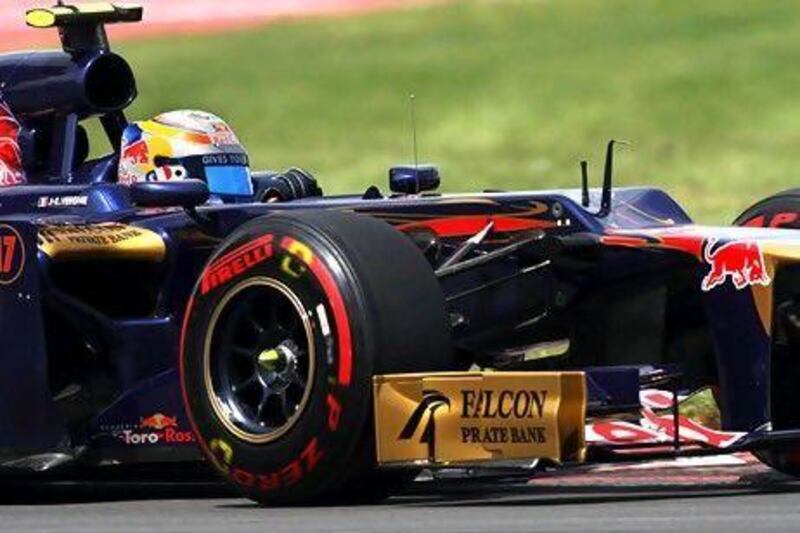Money managers for the world's hyper-rich are more likely to be found tucking into a boiled egg while reading the Financial Times than being spotted on the sidelines of international racing events amid the roar of race car engines.
So what is Falcon Private Bank's logo doing on the nose cone of the Scuderia Toro Rosso Formula One cars and the team's racing overalls?
The bank acknowledges that there is something more to its sponsorship than meets the eye.
"Falcon Private Bank isn't a retail name," says Eduardo Leemann, the bank's chief executive, who was recently relaxing on the sidelines of the Abu Dhabi Grand Prix. "To be on a Formula One car seen by a billion people, you need a big retail name."
Instead, Falcon, which is fully owned by Abu Dhabi's Aabar Investments, uses the sponsorship as an opportunity to treat its ultra-high-net-worth clients.
They get full access to the Paddock Club - a special area for high rollers that usually carries an entry price of US$6,000 (Dh22,038) for the entire weekend - and trips to the starting grid to meet the pit team. And Falcon selects a group of individuals with whom they are likely to do business.
"What I found is that wealthy people like what they think they cannot buy - and this you cannot buy," says Mr Leemann.
He says the fruits of that relationship tend to accrue over many years of customer loyalty, making it hard to assess the individual benefit.
He declined to state how much the bank pays to sponsor Toro Rosso.
As a privately held company, Falcon does not have to justify the level of business it does at the Grand Prix to its analysts. Quite the opposite, in fact.
"We've come into Formula One because of our shareholder," he says. "They have a business vision and they're fans. They use this platform to establish a relationship with companies like Mercedes and Volkswagen and all sorts of counterparties … If I get one new client relationship per season, I'm happy."
Accompanying Falcon on the list of Scuderia Toro Rosso sponsors are Nova Chemicals and Cepsa, both fully owned by the Abu Dhabi Government's International Petroleum Investment Company (Ipic).
Aabar Investments, also owned by Ipic, also sponsors and jointly owns the Mercedes GP Formula One team alongside Daimler.
Sponsoring motor sport has helped to put other Abu Dhabi companies on the map.
Mubadala Development, a strategic development fund owned by the Abu Dhabi Government, previously sponsored the Scuderia Ferrari Formula One team until 2010.
Mr Leemann is hard-pressed to answer whether the type of client who enjoys a day at a Formula One event is likely to crave high-octane investment ideas - high leverage, risky bets and outsized returns if things go to plan.
Compared with Chinese or Russian investors - who are much more risk-tolerant - the bank's Middle Eastern clientele are more conservative since the financial crisis, says Mr Leemann.
In the Arabian Gulf, issues of secrecy and tax predominate.
"Here, you have the ultimate privacy," he says. "And no tax."
The biggest issue for the bank is not ensuring that clients take fewer risky bets, but making sure their assets are compliant with foreign tax codes, he adds.





